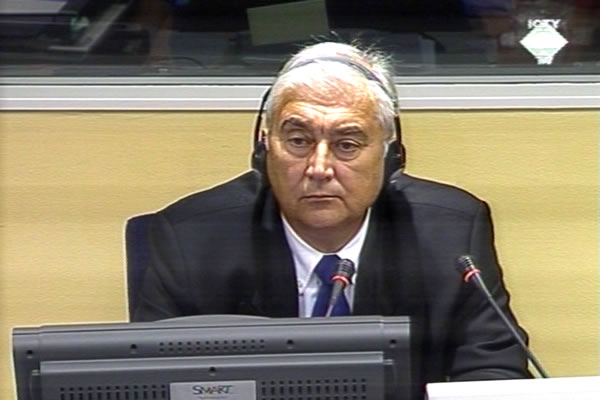Home
DID STANISIC AND MILOSEVIC TRUST EACH OTHER?
Contradicting the prosecutor’s claims about the trust between the former secret service chief and the Serbian president, witness Dragicevic, who was Stanisic’s adviser at the time, contended they never trusted each other. This culminated in their final rift in 1998 over the Kosovo crisis, the witness said. Milosevic decided to use force and Stanisic favored a peaceful solution, the witness explained
 Vlado Dragicevic, defence witness of Jovica Stanisic
Vlado Dragicevic, defence witness of Jovica Stanisic In the last 20 minutes of his cross-examination of former high-ranking Serbian State Security Service official Vlado Dragicevic, the prosecutor contested Dragicevic’s claim that Jovica Stanisic advocated a peaceful solution of the Kosovo problem in the late 1990s. The topic is not relevant for the indictment but has bearing on the credibility of the witness who didn’t tell truth in this case, in the opinion of the prosecutor. Former Serbian secret service chief and his close associate Franko Simatovic are charged with crimes against non-Serbs in Croatia and BH.
The prosecutor brought up a number of minutes from the meetings of the Joint Command of the Army and Police for Kosovo from 1998, which show that Stanisic was present when the Joint Command discussed ‘killing and wiping out KLA terrorists’. The witness replied that it was a legitimate fight against terrorism and not war, adding that Stanisic favored a peaceful solution through negotiations. Dragicevic was called by the defense of the former chief of the Serbian State Security Service; he was first Stanisic’s advisor and then his assistant.
In the re-examination Franko Simatovic’s defense counsel tried to contest the prosecutor’s allegation that Stanisic and the Serbian State Security Service maintained close relations with Slobodan Milosevic. Simatovic’s defense counsel put it to the witness that as early as in 1991 the Serbian Public Security Department was put in charge of Milosevic’s security, instead of the Serbian State Security Service. The witness confirmed the defense counsel’s claim that this was a sign of mutual distrust.
In the re-examination by Stanisic’s defense, Dragicevic repeated that Milosevic didn’t trust the secret service chief but was ‘intelligent enough’ to keep the consummate professional at that post until 1998. The witness claimed that Milosevic was suspicious of Stanisic because of the contacts between the Serbian State Security Service leadership with the CIA agents. In the end, Milosevic and Stanisic fell out because they disagreed on how the Kosovo issue should be dealt with, the witness recounted. According to Dragicevic, Milosevic decided to use force and Stanisic advocated a peaceful solution. At the beginning of the hearing, the prosecution contested this claim made by Dragicevic.
The defense counsel put it to the witness that Stanisic was on better terms with the late Serbian prime minister Zoran Djindjic than with Milosevic. The witness agreed, stressing that on several occasions he saw Djindjic and Stanisic meet. After the assassination of prime minister Djindjic in March 2003, Jovica Stanisic and Franko Simatovic were arrested in a sweeping operation, and soon afterwards they were transferred to the Tribunal in The Hague.
Stanisic’s defense is expected to go on with its case next week, but it might be disrupted because the two next witnesses have refused to come to The Hague voluntarily. One of the witnesses is a Dutchman who served in UNPROFOR in BH, Marcus Helgers; the Trial Chamber has issued him a subpoena. The identity of the second witness remains undisclosed. Once these two witnesses are heard, if ever, the defense of Franko Simatovic will open its case. At one point during Simatovic’s case, Stanisic’s defense lawyers will call two additional witnesses: an expert witness who will testify about the authenticity of Mladic’s diaries and a ‘distinguished witness from England’, as it was announced today.
Linked Reports
- Case : Stanisic & Simatovic
- 2011-11-09 IS COOPERATION WITH CIA DEFENSE AGAINST WAR CRIMES?
- 2011-11-08 ‘PEACEMAKER’ JOVICA AND HOSTAGE CRISIS
- 2011-10-13 INDICTMENT IS ABOUT CROATIA AND BH, DEFENSE FOCUSES ON SANDZAK
- 2011-11-21 AGREEMENT REACHED DURING A BREAK
- 2011-12-07 MILOVANOVIC APOLOGIZES TO STANISIC ON TOLIMIR’S BEHALF
- 2011-12-08 MANOJLO MILOVANOVIC ‘CAN HARDLY WAIT’ TO TESTIFY AT KARADZIC TRIAL
